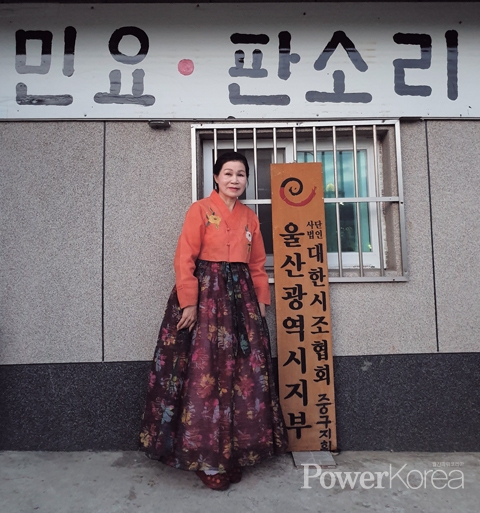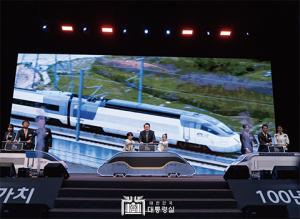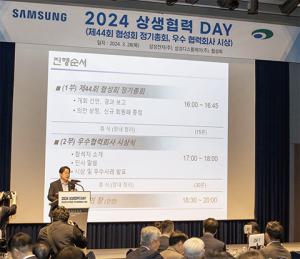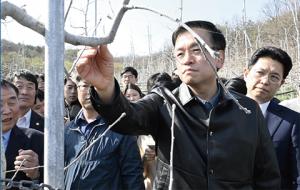 |
||
| ▲ Korean classical music master Youngja Kim | ||
Koreans have loved sound and dance for a long time. Korean classical music contains Korean’s sentiment and is being reinterpreted in the world. It is regretful that some people see Korean classical music as old and conventional but keeping and passing down our valuable cultural assets is very important. In this respect, <PowerKorea> met Youngja Kim, a Korean classical music master.
A respected classical music master in Ulsan
There is Kim Young Ja Gugak Center in Ilsan-dong, Dong District, Ulsan Metropolitan City. This is the place where Kim aka Woljeon stays and passes down her skill to others. Kim was born in Hamyang County, South Gyeongsang Province and has lived here for 45 years. Almost everybody would recognize her by name in Ulsan. She is always busy like she sometimes wonders how a week could pass so quickly. She teaches people at community center on Monday and Wednesday, poem folk songs on Thursday, folk songs at elderly community center, western folk songs on Saturday in Daegu Metropolitan City and participates in various events on Sunday. She also has been doing volunteer for a long time every morning on Monday and Tuesday. Kim’s younger sister also is a Korean classical musician and a calligrapher. Youngja Kim liked sound since her childhood under the influence of her father. In 1995, she became a pupil of Sunsook Lee who won the presidential prize at the 2006 South Gyeongsang Province Regional Korean Classical Music Competition. She also learned poem folk songs from Dukja Ha and wanje poem folk songs from Sangsul Lee. As a result, she obtained a certificate of finish No.10. She carried on learning Korean drums from Yangsook Oh and western folk songs from Sugwan Park who is the intangible cultural asset no.19. She served as the 2nd president of the Korea Poem Folk Songs Association and currently is serving as the president and an instructor of the Ulsan Western Culture Center Folk Song Research Institute and as the branch head of the Western Ulsan Folk Song. In recognition of her contributions to development of local culture, she received the Woman Who Shined Ulsan in 2016.
Passing down Korean opera and poem folk songs to masters
Korean opera is an asset of the UNESCO. The singer sings the song to the rhythm with narrative and exclamation. The genre embraces both scholars and folks alike and the singer invited audience to the story proactively. Korean opera passed down from mouth to mouth and became sophisticated around late 19th century by elements of literature which attracted scholars. Kim sang ‘love song’ and ‘sea palace song’ of <Chunhyangjeon>. Poem folk songs consist of poems and songs and are known as sijeolga, sijeoldanga and danga. Wanjesijo of Kim is a poem folk song centered in Jeolla Province. Most of them are three verse poems and free verse poems but there are some difficult poems like ut-poems and half-free verse poems. The performance is done on a whim with lap rhythm but without instruments, so 5/4 can be reduced at the beginning and the middle. The scale is ‘gyemyeonjo (sad and sorrow)’ and ‘wujo (bright and valiant)’ and it has a good flow and rich sound. It became the South Jeolla Province Intangible Asset No.33 on 5th August, 1999. Following the late Sangsul Lee who was a master in the genre, Kim is passing down the charm of the sound to other at the moment.
Active as a total cultural artist
Kim is a total cultural artist who can do Korean opera, poem folk songs, western folk songs, southern folk songs and Gyeonggi Province folk songs. Western folks songs are the songs sung in Hamyong Province, Gangwon Province and Gyeongsang Province. It uses mi, sol, ra, do and re. Some of the examples are Miryang Arirang, Let’s Sing and Dance Together, Five Hundred Years, Gangwondo Arirang and Jeongseon Arirang. The National Cultural Asset Sugwan Park’s Baekbalga, Youngnammonorae, Sangyeosori, Chiya Chingchingnane and Jangtaryeong are also western folk songs. Gyeonggi Province folk songs were introduced in late Joseon dynasty and the rhythm is ‘semachi’ and the scale is consisted of 5 notes. The rhythm is lighthearted, smooth and lyrical. It became National Intangible Asset No.57 in 1975. Good examples are noratgarak, changbutaryeong, Jindo Arirang, Goodbye Song, Youth Song and Balloon Flower Song. South Jeolla Province folk songs are the songs sung in Jeolla Province, the southwest part of Gyeongsang Province and some part of Chungcheong Province. Good examples are Farmer’s Song, yukjabeki, Jindo Arirang, Ganggangsullae, heugntaryeong, Namwon Castle and Let’s Sing and Dance Together. “Southern folk songs touch the hearts of the people with thick and easy sound. The 12 rhythms are untangled to the sound of joy and sadness by up and down of the voice” explained Kim.
Spreading Korean sound and helping people in need
“I want to spread ours to people” said Kim who has taken the stage home and abroad many times. She joined the Western Folk Song Festival organized to celebrate the PyeongChang 2018 and sang poem folk songs and spent a good time with 200 master classical musicians. Also, she shared the stage of the 2000 Gyeongju World Culture Expo, of the 2004 Beijing Asia Festival and of an invitational performance held in Japan in 2008. Kim also has a good heart and has been helping people in need. She has taught folk songs and Korean opera to elderly people at cultural schools and senior citizen centers while actively engaging in the volunteer of the Daewangam Art Service Corp in Ulsan. She has held a folk song and Korean opera class at community centers for residents. In recognition, she received a folk song and Korean opera service citation on Culture Day in 2004. In 2006, she won the best prize at the Folk Art Opera Competition and the grand prize at the Korea National Folk Arts Contest. Kim has walked a single path as a Korean classical singer and a teacher for a long time. But she is always humble and respects others. She works hard every day and grows her inner strength. Seeing Kim, I feel Korean classical music will only grow more.
홍기인 기자 forum1004@naver.com







